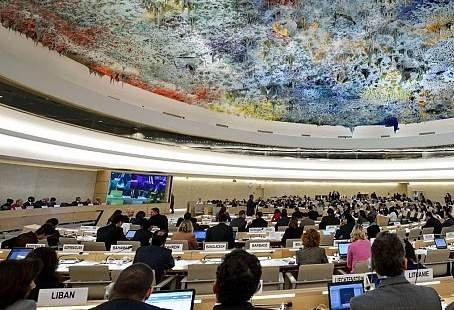The Kingdom of Saudi Arabia has calls for bringing Syria war criminals to international justice and publicizing the names of suspects involved in committing the crimes since the outbreak of the Syrian revolution. This will put an end to the policy of impunity and help protect and deter aggression against civilians in Syria. This came in a speech delivered before the Human Rights Council today by Saudi Arabia’s Ambassador to the United Nations in Geneva Faisal Trad.
Ambassador Trad emphasized that during the nearly four-year Syrian crisis, the Syrian people have suffered the most heinous crimes and violations in the twenty-first century, pointing out that the Bashar Al-Assad’s regime lost legitimacy and is still waging indiscriminately brutal attacks that have claimed more than 221,434 of his own people – mostly children, women and elderly – and displaced nearly more than half of the population.
Ambassador Trad stressed that this regime has gone too far in brutality using internationally banned weapons (chlorine gas), according to a report by the Fact-Finding Mission to Investigate the Use of Chemical Weapons in Syria. The mission held Al-Assad’s regime responsible for using such weapons in three villages in northern Syria, in addition to the explosive barrels and other machines killings and destruction Bashar uses daily amid the silence of the international community.
The failure to take a decisive stand to put an end to the brutality of the ongoing crimes the Assad regime is committing is the main reason for the emergence of armed terrorist groups that found Syria a fertile environment for terrorism. Such groups raised the banner of Islam, though Islam abhors all forms of violence. Yet, under its banner, they practiced what Islam incriminates. The crimes committed by such groups are no different than those the Syrian regime has been committing, Ambassador Trad said.
Ambassador Trad announced the Kingdom is committed to the principles of the preservation of Syria’s sovereignty, independence and integrity of its national territory, and is resolved on the implementation of the Geneva Agreement 1 (June 2012), which aims at achieving a peaceful transition of power in Syria. (Source: Syrian Coalition + Al-Hayat)













